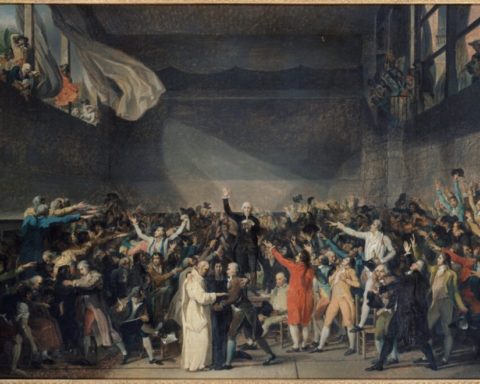Nothing's wrong with the Yahoos anymore. What's the state of the relationship between psychoanalysis and society?
For thirty years, i.e. since the effects of the first oil shock could be measured and the effects of globalisation anticipated, there has been talk of the "need to adapt organisational forms and operating methods to changes in the market and its globalisation". In Europe, the galloping unemployment that appeared shortly after 1973 affected a "critical mass" of the population. In France, in the 1990s, young people considered as "excluded" had known their parents only in a situation of non-work.
This text is a peregrination into the contemporary world, based on my experiences and observations. It first came to my mind the appointment of search engines such as Yahoo, Google or servers such as Wanadoo, Noos - Internet being emblematic of the information revolution that is central to the changes that have taken place. This mode of o-o sound challenged me. At first, I thought I heard a rallying cry from the tribes of Internet users. Then the writing o-o made me see a double zero, which led me to the genealogy of numbers, as well as to those "n", "n+1" or "n-1" found in companies to designate an employee in his hierarchical level, which makes him "the superior or the inferior" of another.
Using Google and Yahoo, this presentation presents "a brief history from scratch", followed by a reflection on "three aspects of the economic world and life at work" and then a "focus on two contemporary phenomena". Finally, by questioning the place of psychoanalysis, I will try to open up.
A brief history from scratch
The American mathematician Edward Kasner 1] in 1935 was looking for a name for the "great number" which would be composed of the number 1 followed by 100 zeros. He asked Milton, his eight-year-old nephew, for help, and the little boy replied, "it's googol! "because he thinks his uncle's question is silly. When Google's founders expressed the intention to use this name, Kasner's heirs sued them, so they wrote "Google" from "Googol". Incidentally, I learned that googol is greater than the number of elementary particles in the universe. Around the idea of "memory" with a very large capacity, we speak today of the "googolplex": the googol power googol!
 As for the Yahoos, they are characters that Gulliver, Jonathan Swift's hero, meets on his fourth trip. Freshly landed on an island, he sees in the trees a curious species of inhabitants jumping from tree to tree with hostile cries:
As for the Yahoos, they are characters that Gulliver, Jonathan Swift's hero, meets on his fourth trip. Freshly landed on an island, he sees in the trees a curious species of inhabitants jumping from tree to tree with hostile cries:
"Some of those demons climbed up the tree, grabbing the branches hanging over the other side, and began to unload their intestines on my head. I could barely take cover by flattening myself against the tree trunk, but I was almost suffocated by the smell of excrement raining down around me. » [2]
It's the Yahoos, that horde of individuals... "Awful, dirty and nasty."They live in the midst of a beautiful, rational, educated people, the Houynhnms, who themselves are horses, of which the Yahoos are slaves: their masters use them as draught animals, in teams of six. The Houynhnms carry out a systematic anatomical comparison between Gulliver and Yahoos specimens. There is "no difference" between this man and the Yahoos [3]!
The Yahoos, and this is how we can understand the choice of name of the founders of the search engine, jump from tree to tree just as today's Internet users surf from link to link, by keyword associations... It is difficult not to think also of what psychoanalysts do when they listen to the free associations of their analysts, so that they find "nothing, perhaps" or "perhaps nothing". But in this case, "nothing more nothing more nothing, it's nothing more nothing, it's nothing more nothing, it's nothing more nothing, it's nothing more nothing, it's nothing more nothing, it's nothing more nothing, it's nothing more nothing, it's nothing more nothing, it's nothing more nothing, it's nothing more nothing, it's nothing more nothing, it's nothing more nothing, it's nothing more nothing, it's nothing more nothing, it's nothing more nothing, it's nothing more nothing, it's nothing more nothing, it's nothing more nothing, it's nothing more nothing, it's nothing more nothing, it's nothing more nothing, it's nothing more, it's nothing more, it's nothing more, it's nothing more, it's nothing more, it's nothing more, it's nothing more, it's nothing more, it's nothing more, it's nothing more, it's nothing more, it's nothing more, it's nothing more, and....Raymond Devos poetically assaulted us! Indeed, how to think of this zero, which the dictionary defines as "cardinal of the empty set, neutral element for the addition of numbers"? This numerical symbol, represented by a hole, made me linger on the emptiness that it draws and, even if it is graphic, anatomical or topological, on the limits that surround it...
Boundary between negative and positive, and like a crossing. As a dividing line, which would be a frontier, the zero is a very fertile operator: apart from the fact that it makes it possible to set "negative" numbers, which are used for temperatures (above, below zero), but also for dating (before or after Jesus Christ), it has made it possible to "treat absence as a presence in the written memory of men" - according to Denis Guedj's formula - and then, when it comes to memory, the crossing takes on the consistency of an expanse. The zero would in this case be like a "bandwidth" in the singular history of each person.
As for the repetition of the o or the zero, enigmatic at first sight, it could be looked at from the side of repetition: double presence or double absence, void upon void, imprint, mourning?... Finally, if the zero "opens the way" to negative numbers, it is also what, by means of the successor function (N+1), "poses a beginning to the scrolling of numbers [4]" ... The zero, this not much, therefore the operator that opens the door to worlds that we can no longer do without, neither to count nor to think, it has proved to be a major element of the logos.
Three aspects of the economic world and life at work
About the "one" and the "two"...
Let's consider some aspects of the economic world and working life: novlangue, the effects of participative management and the proper names of public limited companies.
Novlanguage
 In the novlanguageIn business jargon, "pragmatism" operates as a watchword. It is about doing, having, but not thinking or being or "letters".
In the novlanguageIn business jargon, "pragmatism" operates as a watchword. It is about doing, having, but not thinking or being or "letters".
The novlanguage borrows from various fields, first of all from technology or the physical, chemical, mechanical, hydraulic sciences, etc.. It can be used in the following fields: "mergers, restructuring, performance, fuses". Military and political: "strategy, targets, staffs, objectives, second knives, charismatic leaders". In professional lexicons: "dry cleaners" and dietetics, when the workforce is "fattened" like excess lipids. To that of hired killers: the "DRH killers" have a price, their salary is proportional to the number of employees they have "shot". And behavioural techniques: "assertiveness", "coping", "stress", "self-esteem"...
The euphemism of diplomacy: a mass redundancy becomes a "social plan" or even a "job protection plan", a manipulator: "someone who knows how to motivate", a "harasser": a specialist in "management by stress".
What happens in work has its counterpart in non-work: unemployment. This is the lexicon of the "marketing" of "selling skills" in order to find a job, with everyone being invited to consider themselves as a "product" that has to find their own "niche" or commercial "niche"! In the "candidate fair" that takes place at various fairs and exhibitions, increasingly similar to the SPA's adoption campaigns for dogs and cats, job applicants must "sell themselves" in five minutes. One firm offered training courses for the unemployed entitled "L.O.V.E", acrostic for "Letter to Get an Interview Quickly".
Unemployed graduates are now "precarious nerds". Etymologically, "precarious" means "obtained through prayer", the precarious having for a long time been workers (especially farmers) who rented themselves out by the day. Of these, there are still those we meet in the morning on the side of the rue du Caire (the "Pré-Caire") in Paris, making "precariousness" the state of those who do not have a "pré carré".
Highly skilled workers are indeed unemployed. They prefer to rely on training statistics and become "trainees in continuing education". From the age of 57 years and six months, they receive notification from the Assédic, which has "the pleasure of informing them that they are now "exempt from looking for work": they are no longer "calculated" in the unemployment statistics - should we complain or rejoice at their symbolic euthanasia?
Euthanasia that also affects businesses. In cases of programmed death, a president is in charge of leading the company into "liquidation". The amount of his compensation, known as the "golden parachute", is in this case negotiated at the time of hiring.
The case of the director of a chain of shops who had received a huge bonus for having laid off 700 people was not forgotten, the Dutch parent company thanked him "for service rendered". In the ultra- or neo-liberal perspective, making people redundant in this way is "know-how". There is still talk of "nothing or almost nothing", the social or symbolic weight of the basic employee being "close to zero".
Participatory management
 In this movement was born "management" as a practice, techniques, and even a university "discipline" with its "schools". I am referring in particular to "participative management", which is supposed to encourage personal initiative and to help everyone to develop. Each "one", moreover, through the annual evaluation of employees, a ritual test, is invited to become its own censor, in the name of the company's "values": he or she must first carry out a "self-evaluation". He will not get a "mark", which is considered barbaric, but a "qualitative appreciation" of his work, starting with his own...
In this movement was born "management" as a practice, techniques, and even a university "discipline" with its "schools". I am referring in particular to "participative management", which is supposed to encourage personal initiative and to help everyone to develop. Each "one", moreover, through the annual evaluation of employees, a ritual test, is invited to become its own censor, in the name of the company's "values": he or she must first carry out a "self-evaluation". He will not get a "mark", which is considered barbaric, but a "qualitative appreciation" of his work, starting with his own...
We're all in the "same boat" or the "same boat". The team is "one for all, all for one". The company affirms its "unity", it is "one": at the altar of profit, indeed, "it is money"...
Lacan [5], in 1966, in his 1966 Baltimore speech, declared: "the idea of unifying unity has always been a scandalous lie to me. "So he suggests "to consider unity from another angle, no longer that of the unifying unit, but that of the accounting unit, one, two, three. »
The hierarchy in the company is designated by the formulas N+1, N-1. The salaried individual is counted "as one" on the "headcount". To total a number, not for its name. Exit the subject [6]. Everyone is therefore both an N+n and an N-n. Except for the most junior employee, who is an N-. Thus interchangeability is ensured. One N+1 = another N+1. Some N+2s speak only to their N-1, not to the N-2s, whom they address to their N-1, they speak to "one" step down, not "two", which can then be spelled "Haine-2". The boss, who is the "higher" N, has an N+ of a different order: the shareholder.
The "proper names" of "public limited companies"...
If we associate this question of the genesis of numbers with the idea of a history, a foundation or a genealogy, we also find one in the world of work. In the course of mergers and restructurings, many companies have changed their names.
Some of them went to draw from the Greco-Roman deposit: Thales, Novartis, Aventis. In doing so, they have removed the trace of a foundation, by erasing a name, such as Thomson, or a regional reference, such as Rhône-Poulenc.
To take a name that draws from the cradle of Rome and Athens, is it to endow oneself with a timeless inscription, as if these companies were our "already there", denying their history? Can we speak, for a community, of something that would be the name-of-the-father, or the name-of-fathers?
An unfortunate effect, if there was one, was that of the multinational steel company that took the name Arcelor, in the years when the Law on Professional Harassment was enacted. In this new name, one can hear "aciers de Lorraine", but also, at the same time when the law on moral harassment was promulgated, the slavery evoked by Zola, on the workers of the "forges".
A focus on two phenomena
Dematerialization of the exchange and relocation of the third party
Without dwelling on the nature of the changes (i.e.: did they occur by accentuation of a situation or by rupture, are they in continuity or discontinuity?), I would like to mention the development of the "dematerialization" of exchange and a "delocalization" of the third party.
Dematerialization of the exchange
 Pierre Legendre [7] shows that the enterprise has become "another stage" for aggressiveness, hatred, death drive, sacrifice. In this new kind of theatre, the offices are landscaped and "clinically" clean, there is no blood or corpses. But the adventures follow one another like Sophocles'. It's just dematerialized, a concomitant dematerialization of other phenomena that shake up our categories and some of our representations.
Pierre Legendre [7] shows that the enterprise has become "another stage" for aggressiveness, hatred, death drive, sacrifice. In this new kind of theatre, the offices are landscaped and "clinically" clean, there is no blood or corpses. But the adventures follow one another like Sophocles'. It's just dematerialized, a concomitant dematerialization of other phenomena that shake up our categories and some of our representations.
Purchases of financial products are instantaneous, from one continent to another, in "one click". Space and time as we experience them are subverted. There is no longer any need for the "hand signature" of the players. The body, the materiality, is evacuated.
In companies, if investment on stock exchanges pays more than the industrial base activity, the latter takes a back seat. Once the cash has been released from production, which has made it possible to invest, there is no need to worry about employees buying and then selling their machines and factory walls.
"Without doubt, being negotiated is not a rare situation for a human subject, contrary to the verbiage that concerns human dignity, or even Human Rights. Everyone, at all times and at all levels, is negotiable, since what any serious assessment of the social structure gives us is exchange. » [8]
The value of money, or of securities, becomes the ultimate commodity, and the one that yields the most is no longer just what allows exchanges in a certain "specularity", it is pure "speculation".
Dematerialization is concomitant with ambiguities that support it. For example, an employee who is a shareholder in a company other than the one employing him may become an involuntary accomplice to redundancies in the company of which he is a shareholder. If his company's capital is open, he too may be a victim. But if his company distributes shares, he becomes a partner of his employers. And as a shareholder, he votes at the shareholders' meeting. Therefore, if the accounts show deficits, how is he going to arbitrate internally between his position as a threatened employee in his job and that of a threatened shareholder in his assets? The distinction between the terms employee and employer is blurred.
Financial products are called: "stocks" and "bonds". It's hard not to read "ethics" and "superego". The multiplication of financial holding companies, which manage many of the "firms"[9], do so "on screen"[10]. Total screen even, if the investor has planted his "head office" in some "tax haven". Would the capitalist investor exonerate himself from social concern by simply stating these signifiers: "share" and "obligation"? And thus would he give himself the right to... "enjoy the body"... of the social body.
One third of the business is relocating
Companies draw up their "code of good conduct", their "social charter", their "list of values". These documents, which are not put forward for discussion with the social partners, are gradually becoming reference documents. So much so that new recruits are asked to start by signing them, as an appendix to their employment contract, rather than the "internal regulations", which must be the subject of an official agreement that is recorded in the representative bodies of both parties. This is the beginning of a substitution which acts as a subrogation.
Previously, in the event of a conflict between employee and employer, if the employment contract was not explicit, reference was made to the collective agreement specific to the professional sector concerned. If this did not resolve the conflict, the written, egalitarian and universal Labour Law took precedence. This was called the "hierarchy of norms". From now on, we would like the employment contract to take precedence over the weight of the collective agreement and over Labour Law and to "tell the truth" [11]. [11] These measures are aimed at reversing the hierarchy of norms and making this reversal legal with political support and intervention.
It is in this crucible that the - partly successful - attempt to introduce new employment contracts, presented in particular by employers [12] as social tools but which are "Trojan horses" ready to kick the Labour Law into the ground. Contractualisation as the "tenant-place" of the Law, and of which it is made law, represents the reduction of the employee/employer/law triangle to two parties of unequal strength. The "three" that is held together by "triangulation" is reduced to "two", to a duel between the employee and the employer, thus re-establishing the ancient law of the strongest.
And the politician in charge of the legislature becomes himself an acolyte of a duplication and displacement of the place where the Law is written.
Enlargement, openings?
If the categories explode, what happens to this law?
And indeed, they explode!
To put it quickly, globalization makes the distant close and makes the other similar: there is in the other the same with standardized brands, Nike, Coca-Cola, etc... Borders no longer make a cut or edge, the enemy is no longer outside the borders but inside, the distinction between inside and outside is destabilized. Orange ex-France-Telecom creates the Unik concept, the reversible telephone, fixed and mobile, with the slogan: "Get in and get out".
It's confusing! Guy Lérès speaks of the "möbianisation of modern discourse", Guy le Gaufey evokes that "Reason is slowly disintegrating", which continues :
"If science moves in its intrinsic consistency, the unconscious will be displaced by it; if the state ceases to be what it was, the unconscious will be displaced by it. »[13]
Science... It has now renounced its hegemony over "truth" as one and the same. We no longer speak of the "unity of science". Today, researchers are identifying the historicity of discoveries, contextualizing them, relativizing them, multiplying their points of view, etc. The "unity of science" is no longer a question of "the unity of science". In passing, two illustrations: the book Histoire de l'arc-en-ciel by Bernard Maitte[14], on the many ways of looking at meteorological phenomena. Or Explaining Life[15], by Evelyn Fox Keller, which explores how each era has generated its definitions of life. This former American physicist, who chose to branch off into molecular biology, developed an epistemological reflection that led her to become involved in the issue of "gender" in the language of science (cf. Temps marranes n°4).
Between the project of a universal construction, dependence or subordination to funding methods and powers, and abuse of its technological applications, science can well be the object of criticism. Moreover, as far as we are concerned, the aims of science are certainly not focused on the subject and its singularity. But certain advances are needed in order to think. Those of modern physics, linguistics, logic and topology have provided psychoanalysis with points of reference for thinking. Perhaps it is time to open a workshop to discuss the distinctions to be made within scientific concepts, theories and practices, between research and applications, between heuristic discovery and the aim of endless power, between the "discourse of science" and the conditions of its constitution, between science and invasive technologies.
The state... Europe enacts laws that are "directives", i.e. framework laws, delegating to each country, in the name of the "principle of subsidiarity", the task of formulating its own applications. All States must eventually comply with European directives. Moreover, the extent and the multiplication of exchanges bring justice cases on a multinational ground where the competence of the places of Justice, which must judge the cases, is uncertain.
In fact, with global governance and supra-national groupings, such as the UN, Europe, the Conference of African States, etc., we are witnessing the end of the monopoly of States on the Law.
There's an urgency to take risks
Law and jurisprudence are to be developed. Specialists are working on it, called experts. Expertise is called into question, often rightly so. It is called into question when, as Guy Lérès[16] says, "we see that the effect of academic knowledge on the master's knowledge is interpreted in the 'all-knowledge' of bureaucracy. "This happens when the expert who is paid to think is housed and sheltered in this bureaucracy, or worse, when his "thinking" serves only to contribute to the reinforcement and reproduction of the locks that have been put in place.
But can we nevertheless envisage the foundation of a law without an expert, if the latter is solicited as making a contribution of experience(s), the origin of the term expert[17]? As far as social law is concerned, European experts could have worked more poorly, since, for example, when a company from one country hires an employee in a foreign subsidiary, the employee must benefit from the working and contract conditions of the country that has the least disadvantageous clauses for the employee, which is rightly called the "social best bid".
I found, on a recent CGT leaflet, that the challenge for the years to come is to ensure that social practices are carried out with people in mind: "For the CGT, the workforce, in all its diversity today, needs a common base of guarantees to strengthen and ensure respect for the individual rights of employees. »
And in an economist's book, which I will not voluntarily name, we read that, as far as possible, decisions taken in the collective interest must also take account of individual characteristics.
The best expression of my perplexity in this respect would be this sentence from Lacan's speech in Baltimore: "My experience has shown me that the main characteristic of human life is, as we say in French, "à la dérive". Life goes down the river, touching a bank from time to time, stopping for a moment here and there, without understanding anything... "[18]
However... There are these unexpected turnarounds coming from everyone, far from psychoanalysis, but perhaps sometimes "against" it. Indeed, there is a strong probability that, among the designers, even the authors of articles of law, a good number have spent time on a couch. When I worked in the ministries, I met senior officials who were preparing the law on skills assessment and other social measures. These are what I call the "invisible allies" of psychoanalysis, who by their experience in their place can make psychoanalysis infuse, as if by "capillarity", the social body, perhaps the legislature and the "ethics" of their profession. In this case, each one of them is perhaps a little less "desubjectified" than the one who would not have come into analysis. Otherwise, what we are doing is "zero"! But one different word on a piece of legislation or on an implementing decree - a seemingly insignificant signifier - and something can be changed.
Experts, decision-makers, trade unionists, economists, managers and others are all involved in the analysis. They also listen to the singular rustles that emerge among analysts, to be able to elaborate something with them, closer to where it emerges. In a way, for the analyst, this möbianisation of discourse can, according to Guy Lérès' wish, "at least individually be thwarted". Analysts, therefore, should not oppose their own "novlanguage" to the one in which they are immersed.
"What! exclaimed the Gaufey, we could already no longer understand what today is wrapped up in the name of psychoanalysis, and on top of that we would have to understand how all that is situated on the chessboard of contemporary thought and practices! »[19]
For me, it is urgent for psychoanalysts to go and play on this chessboard, precisely because it has become a "hologram" and a "network" of chessboards. So there are still a lot of building sites to be opened for psychoanalysis. One thinks of this sentence of Lacan during his trip to the United States, exclaiming, in front of the panorama of Baltimore at his window: "the unconscious is Baltimore"!... Our actuality is this Baltimore, this is the very great risk to take. That's the bet I'm making.
Paule PérezPhilosopher, Psychoanalyst...
Time marranes.info
1] Author of Mathematics and Imagination, published in French in 1950, Payot, Paris. Out of print.
2] Jonathan Swift (1667-1745) utopian writer, Anglican cleric, author of Gulliver's Travels (1726).
3] This is where it turns out that the inventors of these search engines are neither devoid of culture nor humor.
4] Zero (or the five lives of Aémer", R. Laffont, 2005.
5] On structure as an interference of the Other as a precondition for any possible subject, 1966, Bulletin of the Freudian Association, No. 41 (1991). Original title: " Of structure as an inmixing of an otherness prerequisite to any subject whatever ", in R. Macksey et E. Donato, The Languages of Criticism and the Sciences of Man, The John Hopkins University Press, Baltimore, 1970.
6] This brings to mind the excommunication to which Lacan refers, comparing his exclusion from the IPA to that which the synagogue inflicted on Spinoza in 1656, Kherem (excommunication) followed by chemmata (impossibility of return): striking off the name. The Four Fundamental Concepts of Psychoanalysis, Threshold Points, Essays, 1973.
7] Pierre Legendre, La fabrique de l'homme occidental, Mille et une nuits, 1999.
8] Jacques Lacan, ibid.
9] The term, paradoxically, comes from the word "firma", signature.
10] Cf. the work presented by Erik Porge on the "souvenir screen", where the screen has a double function, both as a sail and as a projection surface, and therefore as an appearance surface.
11] Excerpt from the speech by the Minister of Labour, F. Fillon, during the parliamentary debate on December 11, 2003, in the National Assembly: ... This law, which affirmed the principle of freedom of contract, remains today the cornerstone, the basis of our right to collective bargaining. (...) The purpose of this reform is to give full scope ... to the law of 1950 by finally fully recognizing contractual freedom. (...) The principle of majority agreement, whatever its form - majority of support or majority of opposition - is established at company level. This is the fundamental point: from now on, company agreements will always be majority agreements, by adhesion or by absence of majority opposition.
12] By the way and the voice of the Medef.
13] "Unebévue" n°20 (autumn 2002): On the subject stuck between "man" and "citizen".
14] Le Seuil, Science ouverte, Paris 2005.
15] Gallimard, Paris, 2004.
16] Still in his article Discursive Copulation ...
17] cf. Temps marranes n°6: "L'année 1800, l'invention des experts", by the same author.
18] Structure as interference... (same reference as note 6).
19] Guy le Gaufey, ibidem.












